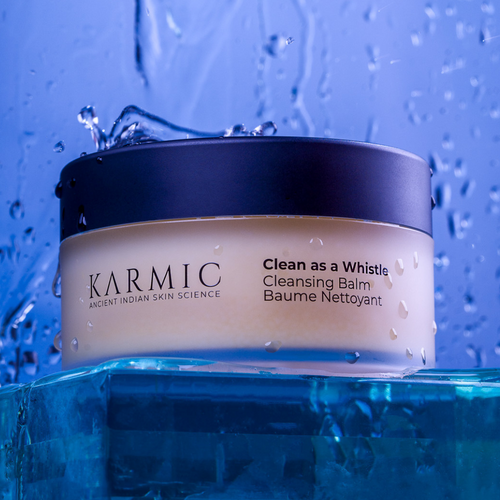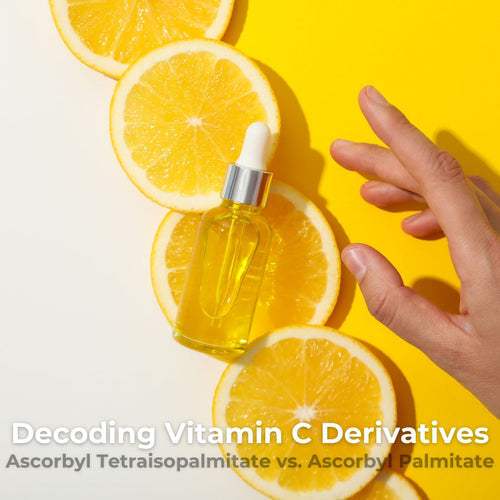Vitamin C has earned its place as a cornerstone ingredient due to its myriad of benefits, from brightening the complexion to reducing the appearance of fine lines. But not all Vitamin C serums are crafted equally.
The efficacy and suitability of Vitamin C largely depend on the type of derivative used. Among the popular forms are L-ascorbic acid, sodium ascorbyl phosphate, magnesium ascorbyl phosphate, and the notably superior ascorbyl tetraisopalmitate.
This guide delves into each form, highlighting each ones unique benefits and challenges.
Understanding Vitamin C and Its Derivatives
Vitamin C, scientifically known as ascorbic acid, is celebrated for its antioxidant properties, crucial in neutralising free radicals that cause oxidative stress to the skin. However, pure ascorbic acid is notoriously unstable when exposed to light and air, which led to the development of more stable derivatives for skincare use.
-
L-Ascorbic Acid
- Pros: Highly potent, well-researched for its ability to boost collagen production, and effective in skin brightening.
- Cons: Highly unstable and can cause irritation and sensitivity, especially in higher concentrations.
-
Sodium Ascorbyl Phosphate (SAP)
- Pros: Water-soluble and more stable than L-ascorbic acid. Known for its anti-acne properties, it converts to ascorbic acid after absorption into the skin.
- Cons: Less potent than L-ascorbic acid and requires conversion by the skin to become effective.
-
Magnesium Ascorbyl Phosphate (MAP)
- Pros: Also more stable and hydrating, effective in lower concentrations, and less irritating than L-ascorbic acid.
- Cons: The potency and speed of results may not be as pronounced as L-ascorbic acid.
-
Ascorbyl Tetraisopalmitate
- Pros: Oil-soluble, highly stable, and penetrates the skin quickly and deeply. Effective at lower concentrations and does not irritate the skin.
- Cons: More expensive due to the complex manufacturing process.
Which is the best Vitamin C derivative?
Out of all the Vitamin C derivatives, Ascorbyl Tetraisopalmitate offers the most compelling blend of stability and efficacy.

It is one of the few forms that is oil-soluble, allowing it to penetrate the lipid layers of the skin barriers more effectively. This characteristic enables it to deliver antioxidant benefits deep within the skin layers, where it can effectively stimulate collagen production and act on hyperpigmentation.
Research published in the Journal of Clinical and Aesthetic Dermatology highlights that ascorbyl tetraisopalmitate can significantly improve photo-damage and skin hydration levels due to its deep penetrating ability. Additionally, its stability in formulations ensures that the product remains effective over time, providing value for money despite its higher initial cost.
Incorporating Vitamin C into Your Skincare Routine
When adding a Vitamin C serum to your skincare regimen, consider the following tips for optimal results:
- Morning Application: Vitamin C provides excellent photo protection, so it’s best applied in the morning to combat UV and free radical damage throughout the day.
- Follow with Sunscreen: While Vitamin C can defend against photoaging, it is not a substitute for sunscreen.
- Optimally Blended Formulations: Opt for serums that are oil-based and blended with other nourishing ingredients such as cold-pressed oils and herbal extracts for maximum effectiveness.
- Night Application: If you can also add in Vitamin C into your night routine you are going to notice results even more quickly as your skin always has a potent antioxidant fighting the damage done to your skin form the sun and daily pollution.
Comparative Analysis
To visually summarise the discussed Vitamin C forms, here is a comparative table outlining their key characteristics:
| Vitamin C Form | Stability | Efficacy | Skin Penetration | Best For |
|---|---|---|---|---|
| L-Ascorbic Acid | Low | Very High | High | Fast Results |
| Sodium Ascorbyl Phosphate | Medium | Medium | Medium | Acne-Prone Skin |
| Magnesium Ascorbyl Phosphate | High | Medium | Low | Dry/Sensitive Skin |
| Ascorbyl Tetraisopalmitate | High | High | Very High | All Skin Types |
The Verdict
While each derivative of Vitamin C has its merits, ascorbyl tetraisopalmitate emerges as a particularly effective choice due to its stability, non-irritating nature, and superior skin penetration. It exemplifies how advanced skincare science can provide powerful anti-aging and skin-brightening benefits in a gentle manner suitable for all skin types.
Choosing the best Vitamin C serum for your skin's needs can significantly enhance your skincare routine, leading to visibly healthier and more radiant skin.




